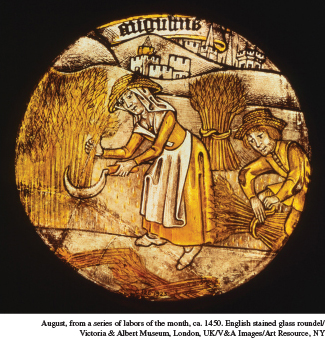Cecilia Penifader, an English Peasant and Unmarried Woman

B orn in 1297 in a small English village, Cecilia Penifader was an illiterate peasant woman, who seldom if ever traveled more than twenty miles beyond her birthplace. She was of no particular historical importance outside of her family and community. Nonetheless, her life, reconstructed from court records by historian Judith Bennett, provides a window into the conditions of ordinary rural people as a new European civilization was taking shape.19
From birth to death, Cecilia lived in Brigstock, a royal manor owned by the king of England or a member of the royal family. Free tenants such as Cecilia owed rents and various dues to the lord of the manor. Thus Cecilia occupied a social position above the serfs, unfree people who owed labor service to the lord, but infinitely below the clergy and nobility to whom the lower orders of society owed constant deference. But within the class of “those who work” — the peasantry — Cecilia was fortunate. She was born the seventh of eight children, six of whom survived to adulthood, an unusual occurrence at a time when roughly half of village children died. Her family had substantially larger landholdings than most of their neighbors and no doubt lived in a somewhat larger house. Still, it was probably a single-
Between 1315 and 1322, as Cecilia entered early adulthood, England and much of the rest of Europe experienced an immense famine, caused by several years of especially cold and wet weather that marked the end of centuries of favorable climatic conditions. During those years, Cecilia first entered the court records of Brigstock. In 1316, another peasant lodged a complaint against Cecilia and her father for ignoring his boundary stones and taking hay from his fields. Such petty quarrels and minor crimes proliferated as neighborliness broke down in the face of bad harvests and desperate circumstances. Furthermore, both of Cecilia’s parents died during the famine years.
Thus Cecilia was left a single woman in her early twenties, but the relative prosperity of her family allowed her to lead a rather independent life. In 1317, she acquired her first piece of land, probably with financial assistance from her father and her own earnings as a day laborer. In fact, Cecilia benefited from the famine because it forced desperate peasants to sell their land at reduced prices. As a result, Cecilia was able to accumulate additional land. By the time of her death in 1344, she was a fairly prosperous woman with a house and farmyard, seventy acres of pasture, and two acres of good farming land. She hired servants or day laborers to work her lands and depended considerably on her brothers, who lived nearby.
If class and family shaped Cecilia’s life, so did gender. As a woman, she was unable to hold office in the manor; she was paid about one-
Unlike most women of her time, Cecilia never married. Did her intended perhaps die during the famine? Did she have a socially inappropriate lover? Did she have an intimate relationship with Robert Malin, a man to whom she left one-
For a woman, the pros and cons of marriage depended very much on whom she married. As a medieval poem put it: “The good and bad happenstances that some women have had / Stands in the choice of a good husband or bad.” So while Cecilia missed out on the social approval and support that marriage offered as well as the pleasures of intimacy and children, she also avoided the potential abuse and certain dependency that married life carried for women.
Cecilia’s death in 1344 provoked sharp controversy within her family network over the familiar issues of inheritance, kinship, and land. She left her considerable property to the illegitimate son of her brother, to the daughter of her sister Agnes, and to the mysterious Robert Malin. Aggrieved parties, particularly her sister Christina and a nephew Martin, succeeded in having her will overturned.
Question: In what ways did class, family, gender, and natural catastrophe shape Cecilia’s life?